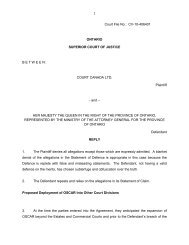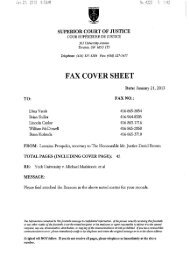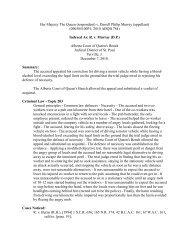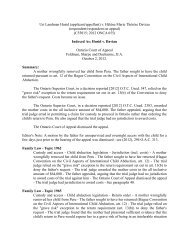Create successful ePaper yourself
Turn your PDF publications into a flip-book with our unique Google optimized e-Paper software.
v Harriman Estates Dev. Corp, 96 NY2d at 414).<br />
Non Sui Juris<br />
Defendant-movant correctly notes that infants under the age of four are conclusively presumed incapable<br />
of negligence (Verni v Johnson, 295 NY 436, 438 [1946] ). Defendant-movant Juliet Breitman, however,<br />
was over the age of four at the time of the subject incident.<br />
For infants above the age of four, there is no bright line rule, and "in considering the conduct of an infant in<br />
relation to other persons or their property, the infant should be held to a standard of care . . . by what is<br />
expected of a reasonably prudent child of that age, experience, intelligence and degree of development<br />
and capacity" (Gonzalez v Medina, 69 AD2d 14, 18 [1st Dept. 19791, citing Camardo v. New York State<br />
Rys. 247 N.Y. 111 [1928]; see also Steeves v City of Rochester, 293 NY 727, 731 [1944] ["The general<br />
rule is that a child is not guilty of contributory negligence if it has exercised the care which may reasonably<br />
be expected of a child of similar age and capacity."']; Weidenfeld v Surface Transp. Corp. of N. Y., 269 AD<br />
341, 345 [1st Dept 1945]; McLoughin v Bonpark Realty Corp., 260 AD 471 [1st Dept. 1940]; Redmond v<br />
City of New York, 81 AD2d 908, 909 [2d Dept. 19811, affd 55 NY2d 796 [1981]; Eagle v Janof, 12 AD2d<br />
638, 639 [2d Dept. 1960]; Yun Jeong Koo v St. Bernard, 89 Misc 2d 775, 779 [Sup Ct. Queens County<br />
1977]).<br />
If conflicting inferences may be drawn, the question is one of fact; if only one inference can be drawn the<br />
question is one of law" (Camardo, 247 NY at 116 [1928]; accord Steeves, 239 NY at 731-32; see also<br />
Weidenfeld, 269 AD at 345; Republic Ins. Co. v Michel, 885 F Supp 426, 432-34 [EDNY 1995] [applying<br />
New York State Law, an infant aged four years, four months was not automatically non sui juris, but could<br />
be found non sui juris upon the presentation of "substantial evidence regarding the child’s lack of<br />
intelligence and maturity”]; cf.<br />
Boyd v Trent, 297 AD2d 301 [2d Dept. 2002] [held, without preliminary discussion, that four year old infant<br />
was non sui juris for contributing to accident by distracting parent from driving,<br />
Page 3 of 6<br />
---------------------------------<br />
presumably because Second Department did not believe the four year old could appreciate the danger of<br />
distracting its parent]).<br />
This method of analysis has resulted in ostensibly conflicting case law, in which children less than a<br />
month apart in age are treated differently as to sui juris status. For example, a child aged four years, ten<br />
months who is hit by a car while crossing the street at his mother's direction is non sui juris as a matter of<br />
law (Ehrlich v Marra, 32 A.D.2d 638 [2d Dept. 1969]).<br />
On the other hand, an unsupervised child of the same age who is struck by a car will not be held non sui<br />
juris as a matter of law, absent evidence that the child is otherwise unable to comprehend the danger<br />
posed by an approaching vehicle (e.g. Camardo, 247 NY at 111, Yun Jeong Koo, 89 Misc 2d at 775).<br />
According to defendant-movant, supervision is the distinguishing factor between these cases. The Court<br />
disagrees. A parent's presence alone does not give a reasonable child carte blanche to engage in risky<br />
behavior such as running across a street. A reasonably prudent child, whom we may presume has been<br />
told repeatedly by the age of four to look both ways before crossing a street(1), knows that running across<br />
a street is dangerous even if there is a parent nearby. Despite this, if a parent or other trusted adult actively<br />
directs a four year old child to cross a street at a certain time, the only logical inference is that the child will<br />
reasonably believe it is safe to cross the street at that time. Because a child above the age of four will only<br />
be non sui jurls if it is impossible under the circumstances to draw any other inference, parental<br />
supervision is unlikely to affect the sui juris status of a child above the age of four unless the parent has<br />
taken an active role in encouraging the child’s conduct (see Camardo, 247 NY at


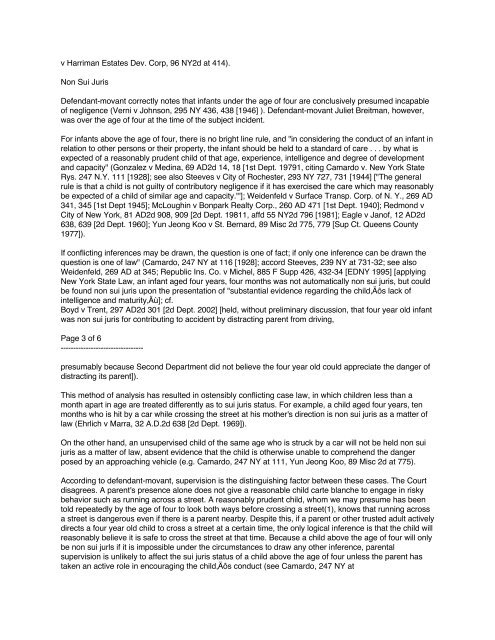
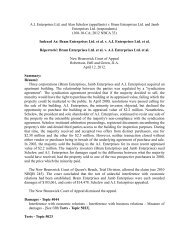
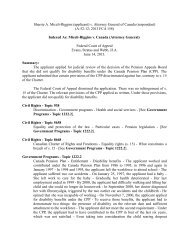
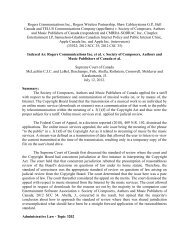
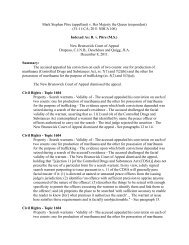
![Jones (appellant) v. Kaney (respondent) ([2011] UKSC 13 ... - Slaw](https://img.yumpu.com/46577625/1/190x245/jones-appellant-v-kaney-respondent-2011-uksc-13-slaw.jpg?quality=85)
